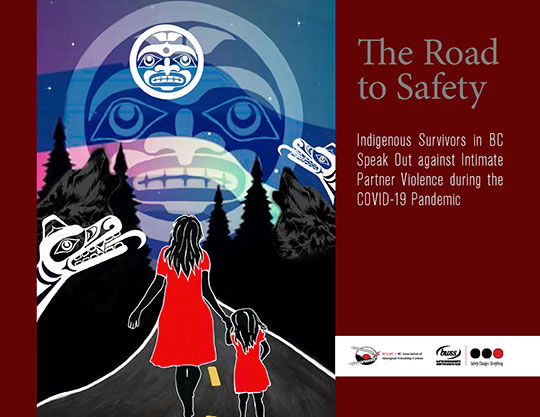The Road
to Safety
Indigenous Survivors in BC Speak Out against Intimate Partner Violence during the COVID-19 Pandemic
The BC Association of Aboriginal Friendship Centres (BCAAFC) and Battered Women’s Support Services (BWSS) undertook a year-long research project “The Road to Safety: Indigenous Survivors in BC Speak Out against Intimate Partner Violence during the COVID-19 Pandemic”
For Indigenous women and gender diverse people, the COVID-19 pandemic is exacerbating the pre-existing reality of gendered colonial violence.
Colonialism lays the foundation for the many ways that Indigenous women and gender diverse peoples are not only experiencing intimate partner violence, but also the barriers Indigenous survivors face in accessing anti-violence supports and safety.
During the pandemic, BCAAFC and BWSS, in partnership with the University of Victoria, engaged in a community-based research project involving surveys and first-hand interviews to understand, raise awareness, and engage in advocacy about the experiences of intimate partner violence that Indigenous women and gender diverse people are facing during the COVID-19 pandemic.
“We live in the North right, it’s already pretty isolated up here as is. When you feel alone, you feel alone. It’s hard to remember that you’re not alone, especially when you’re going through something like intimate partner violence.”
– Indigenous IPV Survivor
Our survey findings show that Indigenous women and gender diverse people are experiencing an increase in the frequency and severity of intimate partner violence (IPV).
For example, 85% of survey respondents reported an onset of IPV during the pandemic and 77% of survey respondents reported that they experienced an increase in IPV during the pandemic.
%
IPV onset during the pandemic
%
IPV increased during the pandemic
Through the research process, guided by the central methodology of “by and for Indigenous women,” our team also found that persistent barriers arose for Indigenous women and gender diverse people seeking protection from intimate partner violence during the pandemic.
Reduced services and service closures, growing waitlists to access services, inadequate access to transport and childcare, quarantine and isolation, racism and discrimination, and the involvement of MCFD and/or law enforcement agencies prevented many Indigenous survivors from accessing anti-violence support services and safety.
When supports were accessed, they were often provided without cultural safety or the autonomy of Indigenous women in mind.
– Indigenous IPV Survivor
We honour the stories of the many courageous Indigenous women and gender diverse people shared through this work.
Many Indigenous survivors offered their stories and recommendations to prevent others from experiencing intimate partner violence, and we hope you join us to move towards making their vision a reality – a road to safety for Indigenous women, girls, and gender diverse people.



